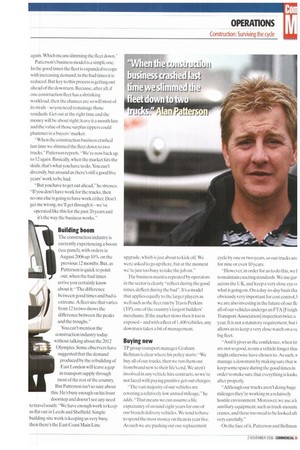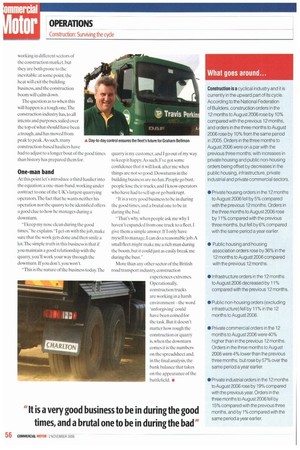BOOM It BUST
Page 54

Page 55

Page 56

If you've noticed an error in this article please click here to report it so we can fix it.
When things get quiet it makes sense to look elsewhere — but say you run specialist vehicles in a cyclical business? Oliver Dixon has been talking to tipper operators about what happens when the boom ends.
The ability to multi-task is assumed in just about every contemporary contract of employment.The days of demarcation disputes arc a dim and distant memory today's employers demand flexibility above just about everything else.
The same observation can be applied to vehicles.You operate a 460hp 6x2 unit on, let's say, fridge work. If that fridge work dries up do you simply sit back and wait for the phone to ring? Not unless you've found a deeply understanding bank manager. Most truck operators would be looking for something else to do a bit sharpish -it's no good having your costly assets gathering dust in a corner of the yard, so it's down to the docks you go with a hired skeletal on your hack.
For tippermen, life isn't so simple.lippers are task-specific, and when the construction industry rests so do they. But according to the cost tables in our sister publication MotorTransport,an 8x4 tipper carries annual fixed costs in excess of f55.000 so resting is not an option except in the very short term. So what is an operator to do?
Fully employed
A Patterson iransport and Distribution operates 12 muckaway tippers from its Barnsley,South Yorkshire, base. When we spoke to Alan Patterson. not only were all his tippers (11 Renault Keraxes and a solitary MAN) out at work; so too were 17 subcontractors. Times are good. But when the economic cycle heads downhill,what are his options?
"Hide and cry," he says."You can't do anything else with a tipper.1 reckon we've got, probably, a good four or live years of going flat out, but then we'll probably have to think again. Which means slimming the fleet down."
Patterson's business model is a simple one. In the good times the fleet is expanded to cope with increasing demand: in the had times it is reduced. But key to this process is getting out ahead of the downturn. Because, after all, if one construction fleet has a shrinking workload, then the chances are so will most of its rivals— so you need to manage those residuals. Get out at the right time and the money will be about right; leave it a month late and the value of those surplus tippers could plummet in a buyers' market.
"When the construction business crashed last time we slimmed the fleet down to two trucks," Patterson reports. "We're now back up to 12 again. Basically, when the market hits the skids, that's what you have to do. You can't diversify, but around us there's still a good five years' work to be had.
"But you have to get out ahead," he stresses. "If you don't have work for the trucks, then no one else is going to have work either. Don't get me wrong, well get through it —we've operated like this for the past 20 years and it's the way the business works."
Building boom
1 he construction industry is currently experiencing a boom (see panel), with orders in August 2006 up 10% on the previous 12 months. But, as Patterson is quick to point out, when the bad times arrive you certainly know about it: "The difference between good times and had is extreme. A fleet size that varies from 12 to two shows the difference between the peaks and the troughs."
You can't mention the construction industry today without talking about the 2012 Olympics. Some observers have suggested that the demand produced by the rebuilding of East London will leave a gap in transport supply through most of the rest of the country. But Patterson isn't so sure about this. He's busy enough on his front doorstep and doesn't see any need to travel south: "We have enough work to keep us flat out in Leeds and Sheffield. Simple building-site work is keeping us very busy, then there's the East Coast Main Line upgrade, which is just about to kick off. We were asked to go up there, but at the moment we're just too busy to take the job on."
'Me business mantra repeated by operators in the sector is clearly "reflect during the good times, deflect during the bad". It's a model that applies equally to the larger players as well such as the fleet run by Travis Perkins (TP), one of the country's largest builders' merchants. lf the market slows then it too is exposed— and with a fleet of 1,400 vehicles, any downturn takes a hit of management.
Buying new TP group transport manager Graham Bellman is clear where his policy starts: "We buy all of our trucks, then we run them out from brand new to their life's end. We aren't involved in an, vehicle hire contracts. so we're not faced with paying punitive get-out charges.
"The vast majority of our vehicles are covering a relatively low annual mileage," he adds. "That means we can assume a life expectancy of around eight years for one of our branch delivery vehicles. We tend to have to spend the most money on them in year five. As such we are pushing out our replacement cycle by one or two years, so our trucks are for nine or event() years.
"However, in order for us to do this, we Ito maintain exacting standards. We use gar across the UK, and keep a very close eye oi what is going on. On a day-to-day basis tha obviously very important for cost control. 1 we are also investing in the future of our Ile all of our vehicles undergo an FTA [Freigh Transport Associationj inspection twice a year. It is not a statutory requirement. hut i allows us to keep a very close watch on a ye big fleet.
"And it gives us the confidence, when tir are not so good, to run a vehicle longer thai might otherwise have chosen to. As such, v manage a downturn by making sure that w keep some space during the good times in order to make sure that everything is looke after properly.
"Although our trucks aren't doing huge mileages they're working in a relatively hostile environment. Moreover, we use a k auxiliary equipment. such as truck-mountt cranes, and these too need to be looked aft. very carefully."
On the face of it, Patterson and Bellman
working in different sectors of the construction market. but they are both prone to the inevitable: at some point. the heat will exit the building business, and the construction boom will calm down.
The question as to when this will happen is a tough one:The construction industry has, to all intents and purposes, sailed over the top of what should have been a trough, and has moved from
One-man band
At this point let's introduce a third haulier into the equation:, a one-man-band, working under contract to one of the UK's largest quarrying operators. The fact that he wants neither his operation nor the quarry to be identified offers a good clue to how he manages during a downturn.
"I keep my nose clean during the good times," he explains. "1 get on with the job. make sure that the work gets done and then smile a lot.The simple truth in this business is that if you maintain a good relationship with the quarry, you'll work your way through the downturn. If you don't, you won't.
"This is the nature of the business today.The quarry is my customer, and Ego out of my way to keep it happy.Assuch.I've got some confidence that it will look after me when things are not so good. Downturns in the building business are no fun. People go bust, people lose their trucks, and i know operators who have had to sell up or go bankrupt.
"It is a very good business to be in during the good times.and a brutal one to be in during the had.
-That's why. when people ask me why I haven't expanded from one truck to a fleet. I give them a simple answer. if I only have myself to manage. I can do a reasonable job.A small fleet might make me a rich man during the boom, but it could just as easily break me during the bust."
More than any other sector of the British road transport industry, construction experiences extremes. Operationally. construction trucks are working in a harsh environment the word 'unforgiving' could have been coined for the task. But it doesn't matter how rough the construction or quarry is, when the downturn comes it is the numbers on the spreadsheet and. in the final analysis, the hank balance that takes on the appearance of the battlefield. •




























































































































































































